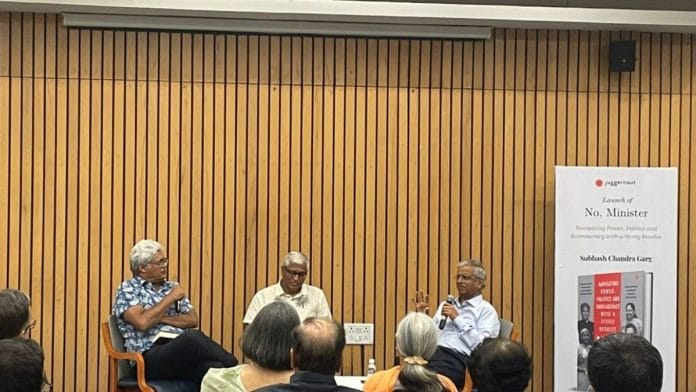New Delhi: Subhash Chandra Garg, the former Finance Secretary of India and a retired Indian Administrative Service officer, pulled back the curtain on the opaque lives of civil servants at the launch of his book No, Minister: Navigating Power, Politics and Bureaucracy with a Steely Resolve.
At the India International Centre, Garg was joined by Ashutosh Gupta, a journalist and former spokesperson of the Aam Aadmi Party, and MK Venu, a founding editor of The Wire, for a panel discussion. Gupta even read excerpts from the book, including the friction between Garg and Finance Minister Nirmala Sitharaman.
“For the first time, I was clearly told – the Prime Minister is unhappy with you. The Finance Minister is unhappy with you. Subash, you are not in tune with the thinking of the government,” read Gupta, turning to a smiling Garg. “Everybody was unhappy with you. I hope your wife is not unhappy with you.”
The crowd, a mix of retired bureaucrats, academics and friends of the author, burst into laughter. Garg’s wife, sitting at the front, also joined in. “If you think these two big guys—the prime minister and finance minister—constitutes everyone, I have no complaints,” said Garg.
Before the panel discussion, opening remarks were made by two other retired IAS officers, Raghav Chandra and Priyadarshi Thakur, who sang praises about Garg’s resolve and the book’s content. But before Chandra dove into some of his favourite chapters, he jokingly provided a disclaimer. “As an invitee, I am duty-bound to promote the book’s sales,” he said, receiving applause from the audience.
Three kinds of civil servants
After spending 36 years in the civil service, including postings in the Ministry of Finance, Ministry of Agriculture and Farmers Welfare and Rajasthan State Road Transport Corporation, Garg wanted to give the public an insight into his tumultuous life. But before diving into specifics, Raghav Chandra shed light on the precarious position Indian civil servants find themselves in.
“Abroad, it’s pretty much a done thing for a civil servant to talk about things because they are on short-term contracts,” said Chandra, adding that in India, civil servants are wary because of the privileged nature of the communication. “I was rather surprised that a low-profile civil servant should have come out of the closet to narrate so many interactions.”
He went on to deliver a powerful lesson—to handle civil servants with care, because “once they start squealing, they can be quite impactful”.
Chandra went on to highlight the three different types of civil servants in the country: The creative, dynamic solution finder, the one who enjoys the status quo and won’t annoy anybody and finally the disruptor, who has the ‘mind of an auditor and nose of a sniffer dog’.
“Subhash leans perfectly in all directions and has all the attributes that are required,” said Chandra, adding that Garg has helped to create institutions and upheld the rule of law. “And from time to time, also disrupted and demolished when he thought something was not correct.”
National vs political interest
To draw interest in the book, Chandra highlighted some of its more exciting elements, including the Rs 720 crore Inter Corporate Deposit (ICD) scam of 1998-2002, which took place during the second tenure of Chief Minister of Madhya Pradesh Digvijaya Singh. Garg had brought the scam to the notice of then Chief Minister Uma Bharti.
“Cases were registered under 55 businesspersons. I made permanent enemies who chased me for the next two decades,” read Chandra from the book, adding that most of the accused slipped away to foreign countries. “In India, public servants who veer off the course can lose their jobs, but businessmen who cheat will find a way to retain their loot and freedom.”
Priyadarshi Thakur, who was 12 to 13 years senior to Garg but from the same Rajasthan cadre, admitted that he hadn’t yet read the book and could therefore provide no specific insights. But Thakur did highlight the nuances in the book’s title.
“Nobody says ‘No, Minister’. There are ways of doing it”, said Thakur, explaining that an outright ‘no’ is rarely employed by civil servants when interacting with politicians. “Anonymity and the ability to say this can’t be done were ingrained at the Mussoorie academy right at the beginning of our days in the service.”
During the panel discussion, Venu and Gupta probed Garg about his ‘disruptive’ nature, reading sections of the book that brought this character trait out. “I think it’s a very important duty of any civil servant to see if something is conducive to the national interest, or is it only serving the political interest,” said Garg.
(Edited by Theres Sudeep)






